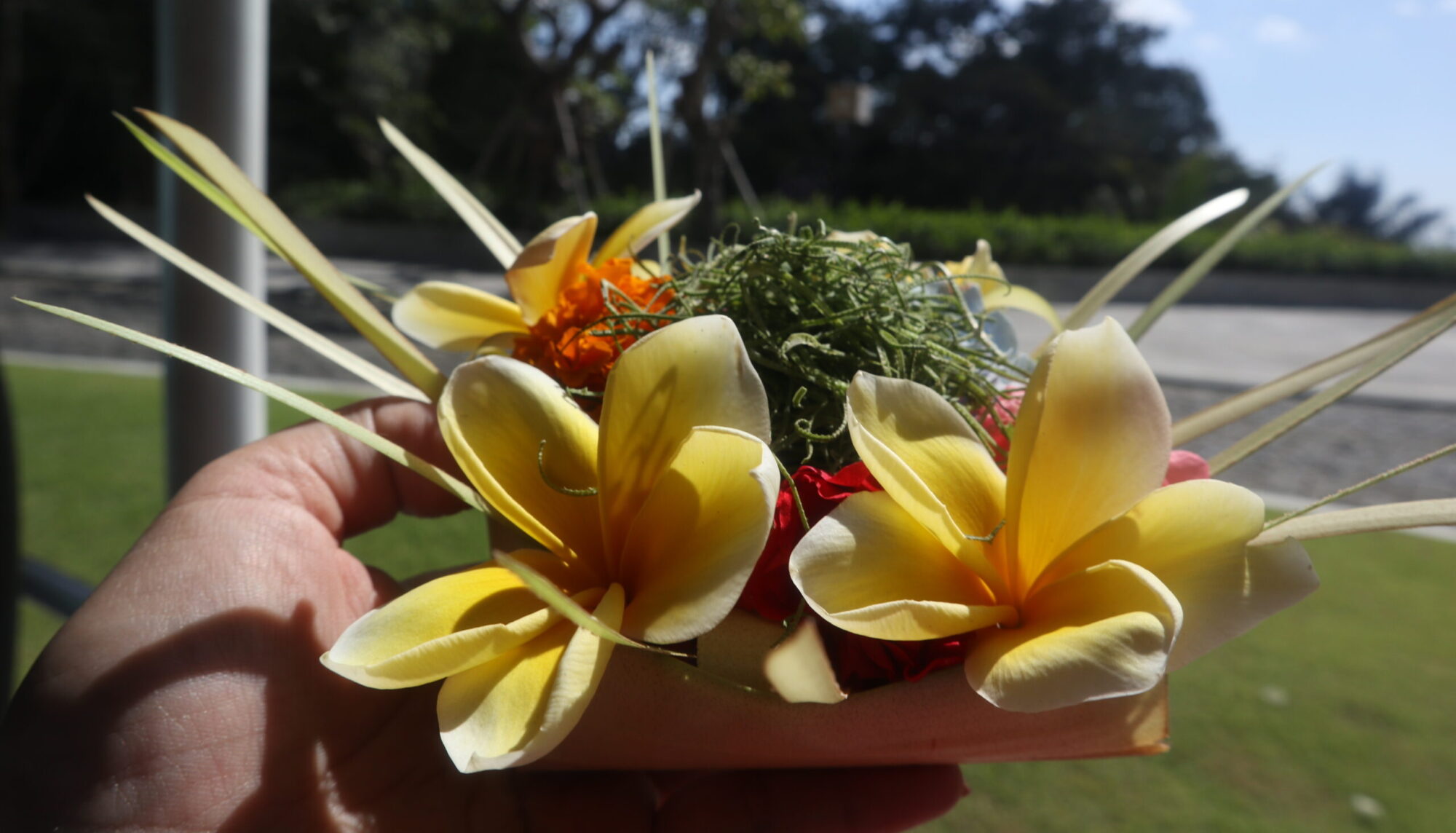During my recent trip to Bali, Indonesia, I had the incredible opportunity to dive deep into the rich cultural tapestry of this enchanting island. One particular experience that left a lasting impression on my soul was the canang-making workshop and temple visit at Ayana. Canang Sari (pronounced as cha-nang), the small palm leaf baskets adorned with vibrant flowers and offerings, plays a significant role in Balinese daily life and rituals. Exploring the art of canang-making not only allowed me to tap into my creative side but also offered me a profound understanding of the local culture and beliefs.
We began our canang-making experience at Ayana with Anika, our knowledgeable guide. Hegreeted us warmly at the lobby of Rimba Hotel and drove us to the lobby of Ayana Segara, where we met Railey. Railey, the skilled workshop coordinator, had meticulously prepared all the materials we would need for the activity. Together, Anika and Railee provided us with a comprehensive overview of the profound philosophy that underlies the art of canang-making.

Understanding Canang and Balinese Culture
Canang, known as Canang Sari, are essential offerings in the spiritual practices of the Balinese people. They are intricately woven palm leaf baskets, traditionally filled with colorful flowers, betel leaves, and various symbolic items. Each element within the canang holds significant meaning, and the offering as a whole represents gratitude, respect, and devotion to nature, the deities, spirits, and ancestors.
Balinese culture is deeply rooted in Hinduism, and these offerings are an integral part of their religious customs. However, the art itself is not limited to Hindus alone as it encompasses other beliefs that deal with a Higher Being, the self, and the surroundings. The act of creating and presenting canang is a way for the Balinese to maintain harmony and balance between the physical and spiritual realms. The meticulous arrangement of flowers and the careful selection of components embody the Balinese belief in the interconnectedness of nature, humans, and the divine.


Ayana: An Enchanting Canang Workshop
Located in the heart of Bali, Ayana is renowned for its commitment to preserving and promoting Balinese culture. The canang-making workshop offered by Ayana is a hands-on experience that takes participants on a journey through the art and spirituality of canang creation.
As I entered the workshop space, a wave of tranquility washed over me. The area was adorned with fragrant flowers, colorful baskets, and neatly arranged materials, setting the perfect ambiance for an immersive cultural experience. Our guide, a knowledgeable Balinese artisan, warmly greeted us, ready to share the secrets of canang-making.
The workshop commenced with an introduction to the symbolic significance of each element used in canang. We learned about the importance of choosing specific flowers, such as frangipani, jasmine, and marigold, which hold spiritual associations and represent purity, beauty, and devotion. Through the guidance of our expert instructor, we carefully crafted the palm leaf baskets, taking great care to weave them into intricate patterns.
Next came the delicate process of selecting and arranging the flowers and offerings within the canang. With reverence, we followed the ancient techniques, arranging the petals, leaves, and symbolic items, such as grains of rice and burning incense. It was a meditative experience, as we focused on creating our own unique expressions of gratitude and reverence.
Throughout the workshop, our guide shared captivating stories about Balinese traditions, beliefs, and the role of canang in everyday life. The depth of their knowledge and their passion for preserving this cultural heritage were evident in every word spoken.






Wearing a Traditional Balinese Dress
Adding to the enchantment, we were escorted to Ayana Resort’s VIP Room, where we were graciously attired in exquisite traditional Balinese garments. Railey, with utmost care and precision, adorned our heads with fragrant flowers and ornate golden accessories, evoking a regal sensation akin to that of a Balinese princess. Fully adorned in our traditional Balinese attire, we embarked on a captivating journey to Pura Giri Wangi, a picturesque temple nestled beside Ayana Segara.




Temple Visit and Canang Offering
Upon reaching the temple, we immersed ourselves in a moment of tranquility. The air was filled with the sweet aroma of burning incense, as our knowledgeable guides expertly placed these fragrant sticks. They delicately positioned candies upon our canang, symbolizing a harmonious union of offerings and blessings. With utmost reverence, they bestowed upon us the sacred touch of rice grains upon our foreheads, an act infused with spiritual significance.
In that moment, time seemed to stand still, enveloping us in a magical ambiance. The experience was profoundly solemn and extraordinarily beautiful, as we connected with the spiritual essence of the Balinese culture. It was an encounter that touched my soul, an enduring memory that I will always cherish.
Participating in the canang making workshop and temple visit at Ayana was a transformative experience, one that allowed me to connect with the essence of Balinese culture. Through the delicate artistry of weaving and arranging flowers, I gained a deeper appreciation for the Balinese people’s devotion to their spirituality and their harmonious relationship with nature.



Ayana’s dedication to providing an authentic and meaningful experience was evident throughout the workshop. By learning about the significance of canang and actively participating in their creation, I not only acquired new skills but also developed a profound understanding of the interplay between art, spirituality, and culture.
As I left the temple, holding the canang I created to my memory, I carried with me a piece of Bali’s soul. The experience had left an indelible mark on my heart, and I felt privileged to have immersed myself in the beauty and depth of Balinese traditions. The canang-making workshop at Ayana had truly been a transformative journey, allowing me to forge a deeper connection with the soul of Bali.
